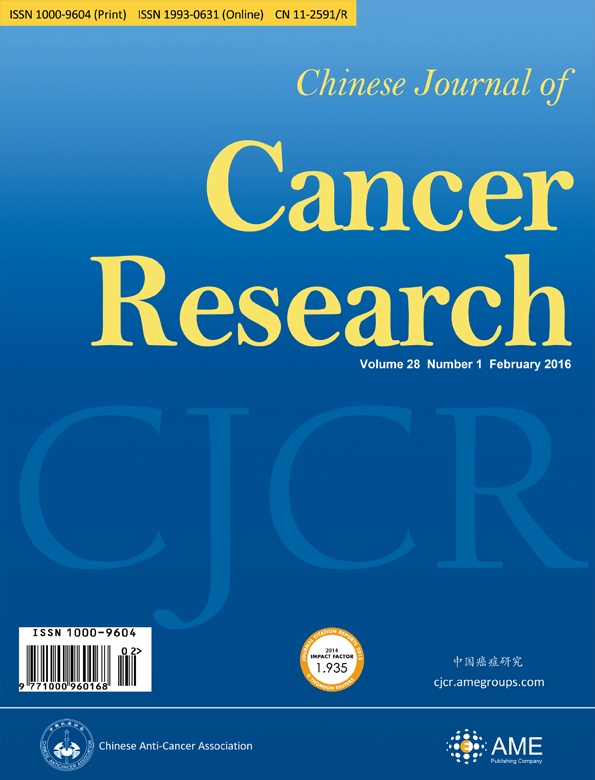Clinical significance of MET gene amplification in metastatic or locally advanced gastric cancer treated with first-line fluoropyrimidine and platinum combination chemotherapy
IF 7
2区 医学
Q1 ONCOLOGY
引用次数: 5
Abstract
Objective To investigate the clinical significance of MET gene amplification in patients with gastric cancer in the palliative setting. Methods MET amplification was assessed using fluorescence in situ hybridization (FISH) in 50 patients and quantitative polymerase chain reaction (qPCR) in 326 patients; 259 patients treated with first-line fluoropyrimidine and platinum were included for survival analysis. Results The results of FISH and qPCR indicated that the c-MET/CEP7 ratio was correlated with gene copy number. The optimal cutoff value for the copy number using qPCR to detect MET gene amplification with FISH was 5 (κ=0.778, P<0.001). Twenty-one out of 326 patients (6.4%) were identified asMET amplification with a copy number of >5 detected by qPCR. MET-amplified gastric cancer was associated with an Eastern Cooperative Oncology Group (ECOG) performance status (PS) score of ≥2 (33.3% vs. 10.5% P=0.007), peritoneal metastasis (76.2% vs. 46.2%, P=0.008), and elevated bilirubin levels (28.6% vs. 7.3%, P=0.006). The median overall survival (OS) and progression-free survival (PFS) were 11.9 and 5.6 months, respectively. MET-amplified gastric cancer was not associated with survival outcomes [hazard ratio (HR)=0.68, 95% confidence interval (95% CI): 0.35−1.32, P=0.254 for PFS; HR=0.68, 95% CI: 0.35−1.32, P=0.251 for OS]. Conclusions qPCR can be used to detect MET gene amplification. MET amplification was not a predictor of poor prognosis in patients with metastatic or unresectable gastric cancer.MET基因扩增在一线氟嘧啶铂联合化疗治疗转移性或局部晚期癌症中的临床意义
目的探讨MET基因扩增在胃癌患者姑息治疗中的临床意义。方法采用荧光原位杂交法(FISH)和定量聚合酶链反应(qPCR)对50例患者进行MET扩增;259例接受一线氟嘧啶和铂治疗的患者纳入生存分析。结果FISH和qPCR结果显示,c-MET/CEP7比值与基因拷贝数相关。用FISH检测MET基因扩增,qPCR检测的最佳拷贝数截断值为5 (κ=0.778), qPCR检测到的P5。met扩增型胃癌与东部肿瘤合作组(ECOG)表现状态(PS)评分≥2 (33.3% vs. 10.5% P=0.007)、腹膜转移(76.2% vs. 46.2%, P=0.008)和胆红素水平升高(28.6% vs. 7.3%, P=0.006)相关。中位总生存期(OS)和无进展生存期(PFS)分别为11.9个月和5.6个月。met扩增型胃癌与生存结果无相关性[风险比(HR)=0.68, 95%可信区间(95% CI): 0.35−1.32,PFS组P=0.254;HR=0.68, 95% CI: 0.35 ~ 1.32, P=0.251。结论qPCR可用于MET基因扩增检测。MET扩增并不是转移性或不可切除胃癌患者预后不良的预测因子。
本文章由计算机程序翻译,如有差异,请以英文原文为准。
求助全文
约1分钟内获得全文
求助全文
来源期刊
自引率
9.80%
发文量
1726
审稿时长
4.5 months
期刊介绍:
Chinese Journal of Cancer Research (CJCR; Print ISSN: 1000-9604; Online ISSN:1993-0631) is published by AME Publishing Company in association with Chinese Anti-Cancer Association.It was launched in March 1995 as a quarterly publication and is now published bi-monthly since February 2013.
CJCR is published bi-monthly in English, and is an international journal devoted to the life sciences and medical sciences. It publishes peer-reviewed original articles of basic investigations and clinical observations, reviews and brief communications providing a forum for the recent experimental and clinical advances in cancer research. This journal is indexed in Science Citation Index Expanded (SCIE), PubMed/PubMed Central (PMC), Scopus, SciSearch, Chemistry Abstracts (CA), the Excerpta Medica/EMBASE, Chinainfo, CNKI, CSCI, etc.

 求助内容:
求助内容: 应助结果提醒方式:
应助结果提醒方式:


